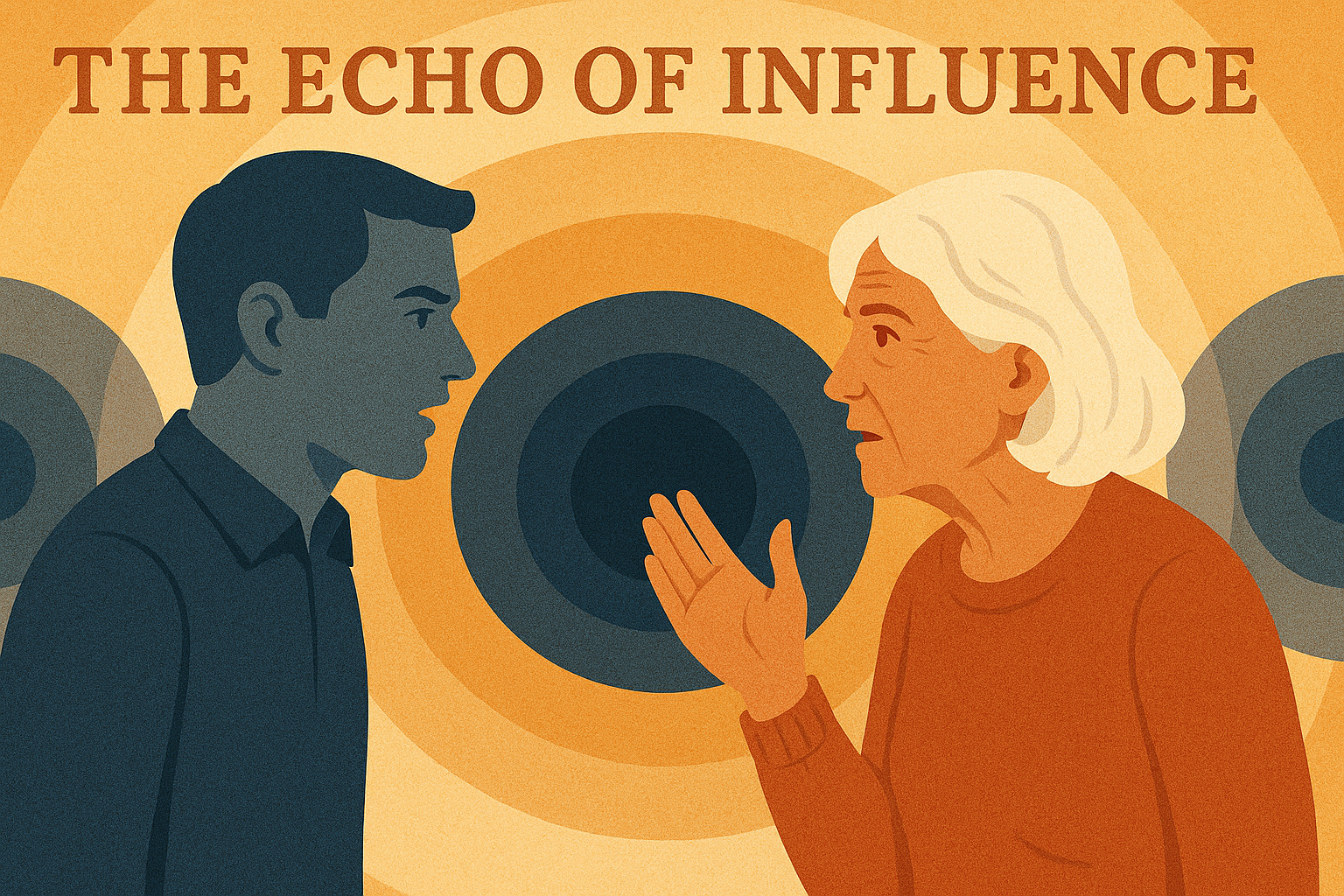
The Echo of Influence: How Small Conversations Can Change a Trust Forever
A Sacramento Story of Words That Went Too Far
Not every inheritance dispute starts with greed. Sometimes, it starts with a simple conversation. Everyday words, often unnoticed, can end up changing a family’s future.
A few years back, a widow in Sacramento named Eleanor came to see me after her brother accused her of coercing their deceased mother’s trust. Their mother, a retired educator well-loved by her neighbors, had planned for years to leave her house and had divided her savings equally between her two children. Six months prior to her death, however, she signed an amendment awarding almost everything to Eleanor, a move that would spark agonizing issues of justice and intent.
To Eleanor, the transformation had been equitable. She had taken years of looking after her mother, cooking, dealing with medications, paying bills, and sitting with her through long, sleepless nights. She recalled each of the late-night phone calls and each visit to the emergency room. To her brother, who lived in Davis and came when he could, the transformation seemed like love was being used as a mask to receive more than his due. He questioned whether his absence had cost him more dearly than he imagined.
There were no yelling arguments or threats, but simply months of tender coaxing: “You know I’ve been caring for you, Mom. Perhaps it’s better if I take charge.” Those words, spoken countless times with love, would later be used as evidence.
The conflict that resulted wasn’t about a house. It was about memory, guilt, and the force of small talk that had legal implications. It was about the narratives families create for themselves and the things they expect each other to understand, which can shape destinies without saying much.
This is why undue influence California law cases are so difficult. It doesn’t usually happen the way a bad actor would plan it. Instead, it tends to come from a close and trusted friend, whose actions are shaped by love, circumstance, and control.
For a deeper look into how subtle influence turns into estate disputes, read Inheritance Heists Ch. 6: Undue Influence by Hackard Law.
What Is Undue Influence, and Why Is It So Subtle?
Under California statute, undue influence California law defines the act as excessive persuasion that overcomes a person’s free will, leading them to behave differently than they otherwise would. There are four factors that courts assess under the California Welfare and Institutions Code §15610.70:
- The vulnerability of the victim, taking into account their age, illness, mental condition, or emotional dependence.
- The relationship or authority of the influencer, usually a care provider, child, or trusted counselor.
- The strategy employed, such as secrecy, isolation, pressure, or subtle manipulation.
- The justice of the outcome, whether the result appears unfair or unexpected.
In practice, these factors highlight the complexity of relationships, not villains. A caregiver who “helps with paperwork” might end up signing the papers. A child who visits daily may become the gatekeeper of an elder’s access to the outside world.
The Sacramento probate courts see such undue influence California law cases every month. Often, the influence stems not from ill will, but from dependency, exhaustion, or misplaced loyalty. Once influence finds its way into a trust or will, it can alter the future permanently unless challenged.
The Sacramento Context: Families, Trust, and Vulnerability
Sacramento’s aging population is growing rapidly. According to the U.S. Census Bureau, more than 14% of residents are age 65 or older, and many live alone. This independence, paired with increasing reliance on caregivers or family, creates a delicate balance between care and control.
A trusted figure may begin by assisting and gradually become dominant in decision-making. Sometimes it happens unknowingly; sometimes intentionally.
At Hackard Law, we’ve seen both forms of undue influence California law violations. For example, a devoted son convinced his father to “simplify things” by signing over property, only for his siblings to contest it later. In another case, a niece helping her aunt close a bank account opened a joint account in her own name instead. What begins as love or help often ends in courtroom litigation and heartbreak.
Sacramento probate judges evaluate not only what was signed, but how, why, and under what emotional climate.
When Care Becomes Control
In Eleanor’s situation, her mother’s declining health left her increasingly dependent. Eleanor handled every transaction, controlled visitors, and managed medications. Her brother, living in Davis, was often excluded.
Each time Eleanor discussed money with her mother, she reassured her, “You don’t need to worry, I’ll take care of it.” Over time, this repeated comfort became expectation. Her mother’s world shrank to Eleanor’s presence alone.
Her mother’s lawyer had retired, and no independent counsel reviewed the amendment. When the trust was executed, it mirrored Eleanor’s preferences, not her mother’s autonomy.
When we sued, the Sacramento Superior Court determined that intent was not the issue; control was. The court ruled that Eleanor’s gradual management displaced her mother’s independence, meeting the criteria for undue influence California law even without direct threats or fraud.
The judgment was corrective, not punitive. The court reinstated the original trust, restoring the mother’s authentic wishes. For Eleanor and her brother, it was both a relief and a reckoning, a step toward healing though the scars would remain.
Frequently Asked Questions About Undue Influence in Trusts
Q1: What is undue influence under California law?
Undue influence occurs when someone uses excessive persuasion to override a person’s free will, leading them to make decisions they would not normally make.
Q2: Who is considered vulnerable to undue influence?
People who are elderly, ill, emotionally dependent, or isolated may fall prey to undue influence, especially if a trusted person is involved.
Q3: How can beneficiaries challenge undue influence?
Beneficiaries can file a petition under California Probate Code §§21380 and 6104, seek independent review certificates, or bring evidence of manipulation in court.
Q4: What are signs that undue influence has occurred?
Signs include unexpected changes in estate documents, limited access to the person, controlled communication, or transactions benefitting the influencer.
Q5: When should a family contact an attorney?
If you observe suspicious changes in trust/will documents, control by a caregiver, or unexplained transfers — consult a trust/estate attorney promptly.
The Human Cost of Influence
Every undue influence California law case carries emotional weight. Families that once shared laughter may grow silent. Grandchildren get caught between divided loyalties. Heirs transform into adversaries.
In Sacramento probate courtrooms, these stories are deeply personal. Judges hear intimate accounts of caregiving, loneliness, and regret. The conflicts arise not from malice, but from blurred boundaries.
In one case, two siblings reconciled years later, realizing that what they truly lost was time, not money. Missed holidays and milestones became the real price of silence.
Seeing the Warning Signs
If you have an aging parent or relative, watch for subtle signs that control is shifting:
- Sudden changes to estate documents.
- Limited communication or blocked visits.
- A caregiver managing all access or correspondence.
- Financial moves that seem uncharacteristic.
- Guilt-based statements like “They’re all after your money.”
Awareness prevents escalation. Early, compassionate conversations can stop influence before it reshapes a family’s legacy.
Prevention: The Most Potent Legal Weapon
In Sacramento, proactive planning is the strongest defense.
Enlist Independent Counselors
Each elder should meet privately with an attorney—no one else present.
Document Key Decisions
Keep prior wills, emails, and revisions to track intentions clearly.
Include Multiple Witnesses
Neutral witnesses add credibility to signings and eliminate doubt.
Utilize Professional Fiduciaries
In conflict-prone families, appoint a neutral trustee to manage assets fairly.
Review Estate Plans Frequently
Update documents regularly to ensure accuracy and prevent undue influence.
Planning ahead does not imply distrust. It is a profound act of love and foresight.
Sacramento Probate Court: When Conflicts Erupt
When undue influence is suspected, families often file a Probate Code §17200 petition in the Sacramento County Superior Court. The process includes:
- Filing to invalidate a will or trust amendment.
- Presenting evidence of isolation or manipulation.
- Introducing medical, financial, and witness testimony.
- Proceeding to mediation or trial for resolution.
Judges in undue influence California law cases prioritize intent and free will. They ensure that estate documents represent genuine consent, not pressure.
Justice may take time, but it restores something invaluable: the truth.
Why Families Delay Action, and Why That’s Costly
Heirs hesitate to challenge estate changes out of fear—fear of judgment, guilt, or being labeled greedy. Yet delay can be devastating. Under California law, trust contests must usually be filed within 120 days of notice.
If you suspect manipulation, act quickly. The goal is not to start conflict but to protect integrity. Silence allows injustice to harden into permanence.
The Psychology of Influence: A Deeper Look
The National Center on Elder Abuse identifies emotional dependency as a key factor in manipulation. When an elder feels indebted—financially or emotionally—they often comply with the influencer’s wishes.
In one Sacramento case, a caregiver reading scripture daily to an elderly man convinced him to amend his trust in her favor. The court nullified it, citing undue influence California law: “Faith and affection are virtues; control disguised as care is not.”
That line captures the heart of this issue: guidance must never erase autonomy.
Lessons for Trustees and Beneficiaries
For Trustees:
- Keep open, written communication.
- Provide regular accountings.
- Separate personal relationships from fiduciary duties.
For Beneficiaries:
- Ask questions early.
- Request trust copies under Probate Code §16061.7.
- Approach matters respectfully, not defensively.
Balance transparency with empathy—this protects both wealth and relationships.
The Role of Experience: Why Wisdom Matters
Years of experience have shown me that undue influence California law disputes rarely stem from evil intent. They grow from imbalance, exhaustion, and misplaced trust.
The court can correct a document, but it cannot heal hearts. Legal remedies restore fairness, but only families can restore peace. True wisdom lies in recognizing that fairness must be paired with forgiveness.
A Sacramento Reflection
In Sacramento, traditions and trusts are intertwined. The same neighborhoods that hold family legacies also witness family conflict. Every estate tells a story of sacrifice and love. When that story is rewritten by undue influence, something sacred is lost.
Preventing undue influence is not about suspicion—it’s about respect, honesty, and independence. When those qualities guide estate planning, trust truly lives up to its name.
A Closing Reflection
Eleanor and her brother eventually reconciled. The court reinstated the original trust, and they later sold the house for closure, not profit.
When I spoke with her later, Eleanor said something that stayed with me:
“I thought helping meant deciding for her. I didn’t know it meant letting her decide for herself.”
This is the ultimate lesson of undue influence California law: when love removes freedom, it becomes control. When guidance replaces autonomy, it creates loss.
To Sacramento families facing similar uncertainty, remember—soft words can echo loudly through generations. Seek fairness early. Seek counsel when unsure. And above all, protect the freedom that love was meant to honor.
For trusted legal guidance in protecting your loved one’s wishes and resolving undue influence California law disputes, contact Hackard Law today.

 (916) 775-8542
(916) 775-8542 